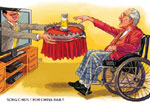UK's Labour vows iron discipline on budget
Updated: 2013-06-03 09:38
(Agencies)
|
|||||||||||
LONDON - Britain's opposition Labour party will seek to convince sceptical voters it is fit to run the economy by promising "iron discipline" on spending and pledging some cuts to welfare benefits if it wins the 2015 election.
Would-be finance minister, Ed Balls, will say on Monday that winter fuel subsidies for the richest pensioners will be scrapped if Labour wins power, a small saving but a sign that the party is determined to show it can cut social spending.
The leadership of the center-left party that ran Britain for 13 years until 2010 has come under pressure from internal critics, including former Prime Minister Tony Blair, who say it is short on specific policy ideas.
Labour has a 10-point lead over the Conservatives in opinion polls. But it lags on the question of who is best to run the economy with memories still fresh in voters' minds of how it managed Britain in the run-up to the financial crisis.
Balls, who was a top finance official in the last Labour government, blamed the need for future cuts on Britain's current Conservative-led coalition government which he accuses of failing to do enough now to get the economy growing again.
"We will have to govern in a very different way and in circumstances very different to what we have known for many years," he will say in a speech at Thomson Reuters in London that is due to begin at 0930 am local time (0830 GMT).
"The situation we will inherit will require a very different kind of Labour government to those which have gone before."
On Thursday, Labour leader Ed Miliband will follow up with another speech on welfare reform, underscoring how the party wants to give voters a sense of its policies even if it remains reluctant about spelling them out two years before the election.
Britain's economy has largely flat-lined for three years as Prime Minister David Cameron focused on cutting public spending and the euro zone crisis caused havoc in key export markets.
Last month, the International Monetary Fund said Britain should bring forward infrastructure spending immediately to help the slow recovery, a call the government is unlikely to heed.
George Osborne, Britain's finance minister or chancellor of the exchequer, has stuck with his plan of 2010 to eliminate Britain's budget deficit, one of the biggest in the European Union. He aims to announce 11.5 billion pounds($17.48 billion) of spending cuts for the fiscal year 2015-16 at the end of June.
When the coalition government took office in 2010, the budget deficit was a towering 11 percent of gross domestic product (GDP) as the global economy slumped and Britain paid dearly for its reliance on its banking sector to bring in tax revenues.
"TOUGH INHERITANCE"
Balls has accused Osborne of throttling the economy with his austerity programme and on Monday he will try to make the blame for future cuts stick firmly with the current government.
"With the Chancellor refusing to change course, Labour must start planning now for what will be a very tough inheritance in 2015," Balls will say. "It will require us to govern in a very different way with much less money around. We will need an iron discipline and a relentless focus on our priorities."
Balls has previously proposed a temporary cut in value-added tax and a home-building programme to get growth going.
A Labour government would work on the basis of falling departmental spending and the party will set out a "clear and balanced plan to support growth, alongside a clear timetable to get the deficit and the debt down," Balls said.
But there was no detail in his speech notes on what that timetable might look like.
Instead, he said Labour in power would end winter fuel subsidies for the richest 5 percent of pensioners. A Labour official said that would save about 100 million pounds a year.
That kind of idea has been supported by members of the Liberal Democrats, the minority partner in the Conservatives' ruling alliance, and might be seen as an overture to the Lib Dems should there be no clear winner of the 2015 election.
Related Stories
UK police: Man charged in UK soldier's murder 2013-05-30 10:55
UK seeks answers in soldier's brutal death 2013-05-24 07:16
Hollande, Cameron condemn murder of UK soldier 2013-05-23 05:33
UK urges action on tax from overseas territories 2013-05-20 09:54
Today's Top News
Xi pledges more aid to Caribbean countries
A meeting of immense scope
Ambassador envisions long, fruitful relationship
Hanban ties up with University of West Indies
Leaders highlight economic ties
Tokyo seeks to catch up in Africa
Dialogue is the way forward in Asia
2 dead, 21 injured in Taiwan quake
Hot Topics
Lunar probe , China growth forecasts, Emission rules get tougher, China seen through 'colored lens', International board,
Editor's Picks

|

|

|

|

|

|





